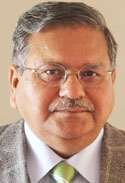Madrasa Education is a Clear Violation of the Human Rights of Children: Sultan Shahin asks UNHRC to make Muslim Countries Stick to their Pious Declarations

By Sultan Shahin, Editor, New Age Islam
U N Human Rights Council, 19th session March 2012 Geneva 27 February– 23 March 2012
Agenda item 3: Promotion of all human rights, civil, political, economic, social and cultural rights, including the right to development
Oral statement by Sultan Shahin, Editor, New Age Islam
On behalf of United Schools International
9 March 2012
Madame Chairperson,
The third annual report the Special Representative of the Secretary General on Violence against Children (submitted to the Council in accordance with General Assembly resolution 65/197 on 13 January 2012), calls on the Member States to renew their commitments to step up efforts in protecting and promoting the rights of children.
But many states, particularly in the Muslim-majority countries, while paying vague lip service to these commitments, are not actually heeding the urges of the world community. Madrasa education given to millions of Muslim children, across the world, for instance, is one example.
Both the *Declarations emanating from Arab countries, Marrakesh 2010 and Cairo 2009, provided in the report, are full of high-sounding resolutions on protecting the rights of children. But it is wealthy Arab countries that fund the tens of thousands of madrasas running across the Muslim world. As practised today Madrasa Education is a clear violation of the human rights of children to equality, dignity and quality education. Along with funds, the petrodollar-rich Arab countries also provide the core curriculum and text books for these madrasas. This teaching provides basic grounding in an extremist religious outlook that keeps these children from interacting with other communities, even other Muslim sects, and thus deprives them of any possible opportunities for a normal life.
Most of the children admitted to these Islamic religious schools come from the poorest of the poor families. They are plucked out of their natural environment where they would have learned some skills necessary to survive as working adults. They are brainwashed in the madrasas by some semi-literate Mullahs and once their utility for attracting Arab funds earmarked for madrasa education is finished, they are literally thrown out on streets without any means or skills for survival. The wealthy and middle class Muslims do not send their children to madrasas, as they know that the only careers available to these children is to become low-paid Imams or Muezzins in village mosques. In some countries, like Pakistan, though, there is another option too. They can turn into suicidal human bombs, bringing some short-term prosperity to their impoverished families, but losing their own lives and killing scores of innocent men, women and children of other religions or other Islamic sects.
The madrasa educated have become easy prey to the terrorists because they have been given an education that neither values life in this world nor teaches them respect for other religions, and civilisations. Indeed, it teaches them to consider all verses of the Holy Quran as of universal significance, though the Quran is a compilation of situational verses, some of which came to provide instructions for those specific situations alone.
But nowhere in the world does the madrasa curriculum teach students to distinguish between the verses of universal and transitory significance like the ones that came during the defensive wars that Prophet Mohammad had to fight. Nor is the strong Quranic message of plural co-existence passed on to them in its right spirit.
I would, therefore, urge the Council, to find some way to make countries stick to the promises and pious declarations they make to appear to be part of the comity of nations. The Council should also reiterate the Durban Declaration’s goal of Dialogue among civilisations through education to all without any discrimination. Good quality education given to all students in Muslim societies would be conducive to both peace and prosperity of the world.
United Nations Webcast - UNIS, General Debate Item:3 (cont.), 27th meeting 19th Session 09 March 2012
*The special representative’s report includes an Annex entitled: Political commitments by regional organizations and institutions to prevent and address violence against children in the framework of the process of follow-up to the recommendations of the United Nations Study on Violence against Children. This presents two declarations from Arab countries.
*1. Marrakesh Declaration adopted by Fourth High Level Conference on the Rights of the Child, December 2010
2. Cairo Declaration on the Convention on the Rights of the Child and Islamic Jurisprudence. November 2009
